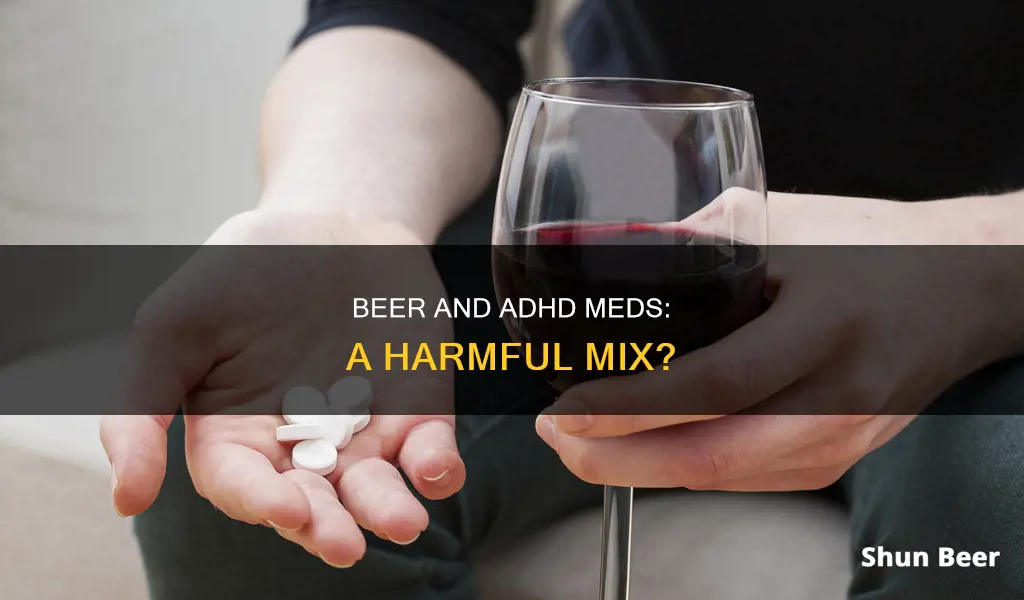
Drinking alcohol while taking ADHD medication is not recommended. Alcohol is a central nervous system depressant, while medications for ADHD are stimulants, and the combination of the two can have dangerous effects on the body. Alcohol can also change the way ADHD medication works, increasing the amount of the drug in your system and leading to a higher risk of overdose.
What You'll Learn

Alcohol and ADHD medications can cause heart problems
Alcohol and ADHD medications can have dangerous interactions, and one of the most significant risks is the potential for heart problems.
Stimulant medications, such as Adderall, Ritalin, and Vyvanse, are commonly prescribed for ADHD. These drugs can interact with alcohol and lead to serious side effects, including heart-related issues. The combination of alcohol and stimulant medications can increase the risk of cardiovascular problems, such as an elevated heart rate, chest pain, and even heart attack. This risk is particularly high for individuals with a history of heart disease.
When alcohol is consumed with stimulant ADHD medications, it can alter the way the body processes the drugs. This can lead to higher amounts of the medication in the system, resulting in increased side effects. For example, Ritalin, a commonly prescribed stimulant for ADHD, can increase blood pressure and heart rate. When combined with alcohol, the risk of these side effects may be amplified, posing a threat to cardiovascular health.
In addition, alcohol itself can have negative effects on the heart, especially when consumed in excess. Heavy drinking can lead to cardiovascular issues such as high blood pressure, coronary disease, and an increased risk of heart attack and stroke. When combined with ADHD medications, these effects can be even more pronounced, putting individuals at an even higher risk of heart-related problems.
The interaction between alcohol and ADHD medications can also increase the risk of alcohol poisoning and overdose. Alcohol can cause the medication to be released too quickly into the body, leading to dangerous side effects and overdose. This rapid release of medication can further exacerbate the strain on the cardiovascular system, increasing the likelihood of heart problems.
Overall, the combination of alcohol and ADHD medications can have serious consequences for heart health. It is essential for individuals taking ADHD medications to avoid alcohol consumption to minimize the risk of heart problems and other dangerous side effects.
Invisalign and Beer: What You Need to Know
You may want to see also

Mixing the two can lead to overdose and alcohol poisoning
Mixing ADHD medication and alcohol can lead to overdose and alcohol poisoning. This is because the stimulant effects of ADHD medication can counter the sedating effects of alcohol. As a result, people may drink more alcohol than they would otherwise, without feeling the full effects of intoxication. This can lead to alcohol poisoning, which can be life-threatening.
Alcohol also changes the way the body processes ADHD medication, leading to higher amounts of the medication in the body and, therefore, an increased risk of overdose. This risk is even higher when long-acting, extended-release forms of ADHD medication are taken with alcohol, as alcohol can cause these forms of the drug to be released rapidly into the body.
In addition, both substances can put a strain on the heart over time, increasing the risk of heart attack and stroke.
Drinking Dark Beer While Breastfeeding: What You Need to Know
You may want to see also

The combination can cause physical and mental health issues
The combination of drinking alcohol and taking ADHD medication can cause physical and mental health issues. Alcohol is a central nervous system depressant, while ADHD medication is a stimulant. When combined, these two substances can have a range of dangerous effects on the body and mind.
Firstly, the stimulant effects of ADHD medication can mask the sedative effects of alcohol. This can lead to alcohol poisoning as individuals may drink more than they usually would without realising how drunk they are. Alcohol poisoning can cause difficulty breathing, confusion, unconsciousness, and even death.
Secondly, the combination of alcohol and ADHD medication can increase the risk of side effects from both substances. These side effects include dehydration, cardiovascular problems, aggressiveness, nausea, vomiting, hypertension, long-term cardiovascular disease, impaired vision, and reduced reaction time and motor functions.
Thirdly, the combination can increase the risk of substance abuse and the development of addiction. This is because the stimulant effects of ADHD medication can counter the sedating effects of alcohol, prompting individuals to drink more. This can lead to a cycle of heavy drinking and an increased risk of alcohol use disorder.
Lastly, the combination of alcohol and ADHD medication can have negative long-term effects on cognitive function and emotional well-being. It can cause severe cognitive issues, damage to the central nervous system, and emotional effects such as long-standing depression, loss of motivation, potential psychosis, and apathy.
Overall, the combination of drinking alcohol and taking ADHD medication can cause serious physical and mental health issues, including an increased risk of side effects, substance abuse, and long-term cognitive and emotional problems. It is important to avoid mixing alcohol and ADHD medication to prevent these harmful consequences.
Beer and Creatine: Mixing Alcohol and Supplements
You may want to see also

It can lead to an increased risk of substance abuse
While drinking a beer while taking ADHD medication is not advisable, it is important to understand the risks involved in mixing the two. One of the primary concerns is the increased risk of substance abuse and the development of addiction.
ADHD, or Attention Deficit Hyperactivity Disorder, is a mental health disorder characterised by inattention, hyperactivity, and impulsive behaviour. People with ADHD often struggle with focus, organisation, and managing their impulses. This condition can affect both children and adults, and while it is often diagnosed at an early age, it can persist or be diagnosed later in life.
The most commonly prescribed medications for ADHD are stimulant drugs, such as Adderall, Ritalin, and Vyvanse. These drugs work by increasing the levels of certain chemicals in the brain, such as dopamine and norepinephrine, which can improve focus and alertness. However, when mixed with alcohol, these stimulants can have dangerous and unpredictable effects on the body and mind.
Alcohol, on the other hand, is a central nervous system depressant. It slows down bodily and mental functions, causing slurred speech, impaired coordination, and cloudy thinking. When mixed with a stimulant like Adderall, the effects of alcohol can be masked. The stimulant may elongate the period of alcohol-induced stimulation and delay its sedating effects, making it harder for an individual to realise how drunk they are. This can lead to binge drinking and alcohol poisoning.
Additionally, both substances can put a strain on the heart and increase the risk of heart attack and stroke. The combination of the two can also lead to dangerous side effects such as seizures, impaired vision, and extremely impaired motor functions.
The masking effect of stimulants on alcohol intoxication can make it easier for individuals to consume excessive amounts of alcohol, increasing the risk of developing an alcohol use disorder or addiction. This risk is heightened for individuals with ADHD, as they are already more likely to misuse alcohol and develop an alcohol use disorder. According to research, people with ADHD may start drinking at an earlier age, engage in binge drinking, and experience more severe ADHD symptoms when under the influence.
Furthermore, the combination of ADHD medication and alcohol can lead to physical dependence on both substances. This means that stopping the use of either substance can result in withdrawal symptoms.
In conclusion, drinking alcohol while taking ADHD medication is not only dangerous to one's physical health but also increases the risk of substance abuse and addiction. It is crucial for individuals taking ADHD medication to avoid alcohol consumption and seek alternative ways to manage their symptoms.
Mormons and Non-Alcoholic Beer: What's the Verdict?
You may want to see also

It can worsen symptoms of ADHD
Drinking alcohol while taking ADHD medication can be harmful to your health in several ways. One of the main risks is that it can worsen the symptoms of ADHD.
Alcohol is a central nervous system depressant, which means it slows things down. It can affect your coordination, making it harder to walk and keep your balance, and impair your ability to think clearly and control impulses. When combined with ADHD medication, the effects of these two substances do not cancel each other out but instead combine to cause bigger problems.
Research has shown that people with ADHD are more likely to misuse alcohol, and that alcohol use can worsen the symptoms of the disorder. A 2009 study found that participants with ADHD were more likely to show signs of alcohol impairment, even when asked to complete tasks that typically decrease impairment. A 2018 twin study also found that more severe childhood ADHD was associated with earlier alcohol use, as well as frequent or heavy drinking.
Alcohol can change the way your body processes ADHD medication, leading to higher amounts of the drug in your system and increased side effects. For example, Ritalin is a stimulant medication that can increase your blood pressure and heart rate, and alcohol can increase the risk of heart problems associated with the drug.
In addition, because ADHD medication can mask the sedative effects of alcohol, you may drink more than usual, which can lead to alcohol poisoning. This dangerous condition can cause difficulty breathing, confusion, unconsciousness, and even death.
Beer and Dieting: Can You Have Your IPA and Drink It?
You may want to see also







